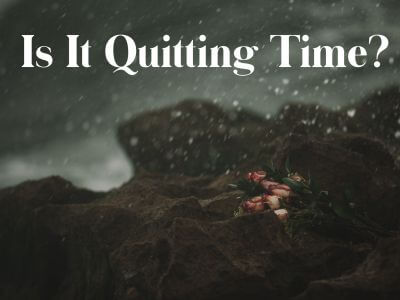Is It Quitting Time? Resources to Help…
https://savethemarriage.com/stmblog/wp-content/themes/corpus/images/empty/thumbnail.jpg 150 150 Lee H. Baucom, Ph.D. Lee H. Baucom, Ph.D. https://secure.gravatar.com/avatar/669b7e375d93f77521ddaba08adb8063?s=96&d=blank&r=pg It would be nice if the process of saving your marriage is straight-forward, direct, and without any bumps along the way.
It would be nice if the process of saving your marriage is straight-forward, direct, and without any bumps along the way.
Rarely is that the case. Many times, it is 2 steps forward and 3 steps back, then 3 steps forward and 2 steps back. Sometimes, it can feel like nothing is moving. Then, things lurch… even jump… forward.
The biggest risk? Discouragement and frustration leading you to quit. Friends and family encouraging you to quit.
No, you don’t have to keep on trying, indefinitely. There are times when you might decide to quit. But what you don’t want to happen is for your emotions to lead you to quit. IF it comes to it, you want to decide to quit. Not just feel like quitting. But making a decision.
Otherwise, you want to make sure you keep heading forward.
And when you are frustrated, feeling discouraged, and listening to those “quit” messages, you may need some help staying on-course.
Below are some selected trainings to help you deal with those times.


